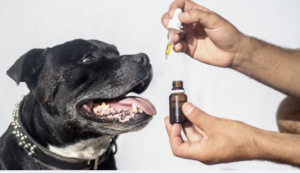Pets are an integral part of many of our lives. When our four-legged friends are unwell, we treat them like any other family member and try to seek out the best medical attention possible. Unfortunately, there are times when conventional treatments are unsuccessful, and this has led to many pet owners being curious about how medical cannabis or CBD oil may help. We answer all your Frequently Asked Questions about CBD oil.
What is CBD oil?
Cannabidiol (CBD) is a type of cannabinoid found in the Cannabis plant species. Since its discovery in 1940, it has been researched for a range of medicinal actions in humans. More recently, investigations into the use of CBD for our beloved pets has surged.
Will my pet feel “high” after taking CBD oil?
Unlike its major cannabinoid partner THC, CBD is non-intoxicating and won’t provide the euphoric or ‘high’ feeling that is experienced with THC. CBD has been researched for a range of uses including anti-inflammatory, anticonvulsant, anxiety-easing, painkiller and antioxidant effects. It is thought the antioxidant and anti-inflammatory properties of CBD contribute to its action as a neuroprotective agent.
CBD can be extracted from numerous cannabis varieties. The Cannabis sativa subspecies is most commonly used for the cultivation of a plant with high CBD and low THC content.
How will my pet take their CBD oil?
CBD oil for veterinary use is given orally (by mouth) – it can be syringed directly into the mouth or mixed with food. CBD is extracted from the plant then mixed with a carrier oil (such as MCT oil), and a flavour enhancer can be added for those fussier pets! (CBD isolate has no smell or taste).
CBD can also be made into formulations for capsules, or topical and transdermal applications. One piece of research investigated the blood plasma levels of CBD following 3 different methods of delivery; micro-encapsulated beads, infused oil and transdermal cream. The CBD oil was superior to the other two products as it increased the absorption and bioavailability. The authors note the transdermal application of CBD may not be absorbed as well into the dog’s blood as we see in humans and other animals due to differences in skin thickness and structure.
Despite this, CBD in transdermal creams or other topical application may be of benefit to pets with inflammatory skin conditions. Given how common dermatitis is in pets, more research in this area is definitely needed.
Powders, infused pellets or treats are available in certain markets, though aren’t favoured due to the difficulty in determining a consistent dose.
How can CBD oil help my pet?
The benefits for CBD in pets are similar to those for humans. According to research, CBD oil may be helpful for pets with epilepsy, arthritis, chronic pain and anxious behaviours. Some pet owners have also shared positive outcomes when treating their pets with CBD for the symptoms of cancer, diabetes and gastrointestinal concerns.
Research papers are ever emerging – some recent ones look at the use of CBD in the treatment of canine atopic dermatitis, separation anxiety and car travel.
A 2019 Canadian survey of dog owners in international markets shows medical cannabis products are most commonly utilised by pet owners to relieve their pets’ chronic pain, inflammation, sleep disturbance, nausea and vomiting, anxiety and phobias.
Is THC-containing medicinal cannabis safe for pets?
Medical cannabis formulations including THC are helpful in certain conditions in humans, however, in pets THC may not be as helpful.
Just like humans, all animals have an endocannabinoid system (ECS) that maintains homeostasis (biological balance) across all body systems. In addition to this integral role, ECS receptors are responsible for mediating the psychoactive effects of THC through CB1 receptors. Dogs have a very high level of CB1 receptors in the brain which makes them more susceptible to the psychoactive effects of THC.
Cannabinoid medicines including THC may contribute to the entourage effect, where phytocannabinoids, terpenes and flavonoids act synergistically, enhancing the therapeutic effect.
Therefore, there is a possibility that very small amounts of THC in pet formulations may have beneficial effects, especially in regards to pain, when combined with CBD. Vets have reported using ratios of 1:100 THC to CBD, though more clinical research needs to be done in this space, and if you have any concerns regarding the formulation, please ask your your vet or contact CBD Vets Australia.
Is there research supporting CBD for pets?
As a result of increasing research in humans for CBD, public interest into the use of cannabinoid medicines to treat pets has grown. Much like the medicinal cannabis industry at large, research is lagging behind public appetite.
At this stage, research on cannabinoid medicine for veterinary use is fairly sparse but there is more and more emerging every few months. Most research focuses on CBD use in dogs, as opposed to any other species. We constantly update our Vets Portal with the latest research publications.
CBD oil for osteoarthritis (OA) in dogs
There have been a few key studies evaluating the use of CBD in dogs with OA. In 2018, a paper was published on the pharmacokinetics, safety and efficacy of CBD for dogs with osteoarthritis. It showed a dose of 2mg/kg body weight twice daily reduced pain scores and improved mobility measures.
These positive outcomes were exhibited without negative side effects, so the researchers chose to also evaluate a dose of 8mg/kg twice daily. This did not show any adverse outcomes or negative neurological changes. However, given the efficacy of the 2mg/kg twice daily dose, the authors note this may be a more cost-effective choice, especially for larger dogs with a higher body weight.
This 2023 study looks at a CBD injection for dogs with osteoarthritis, and the results display reduced pain scores, increased wellbeing, and minimal side effects after six weeks of treatment.
This meta-analysis of the efficacy and safety of CBD for canine osteoarthritis (2023) looked at five different studies and it concludes that CBD is a safe treatment for dogs with OA. It demonstrates that CBD may reduce pain scores but further quality research is warranted.
Can my pet’s epilepsy be helped by CBD oil?
A more recent study investigated the use of CBD for dogs with epilepsy when compared with a placebo. Over the 12 week trial, a significant (33%) reduction in seizures was observed in dogs taking CBD. Two dogs were withdrawn from the study after exhibiting ataxia otherwise, no other adverse effects were reported.
A relationship between seizure frequency and plasma CBD levels was observed, and dogs with a higher concentration of CBD in blood plasma exhibited few seizures, suggesting a higher dose may provide better outcomes. We know from research in humans with idiopathic epilepsy, that higher doses of CBD often provide better results in terms of seizure frequency.
Will my pet experience side effects from CBD?
As with any medication, there are always pros and cons to be aware of. With proper advice from a veterinarian trained in CBD prescribing, possible side effects can be mitigated.
The main consideration for treating pets with CBD oil is gastrointestinal (GI) symptoms. Diarrhoea and vomiting were observed in dogs by McGrath and colleagues, although they could not rule out these symptoms occurring due to other reasons, e.g. diet changes, stress, being housed in a new facility and/or sharing enclosures. Giving CBD oil with food, and slow dose titration (as prescribed by your vet) will help to minimise GI disturbance.
Other clinical signs observed in dogs across three different delivery methods were erythematous pinnae (redness/inflammation around the ear), ocular and nasal discharge. Again this research utilised comparatively higher doses of CBD compared to the arthritis or epilepsy studies mentioned earlier. When it comes to dosing, it is recommended to start low and go slow.
In terms of blood markers, the most common change seen in dogs taking CBD is an elevation in alkaline phosphatase (ALP), and in cats it’s an elevation of alanine transaminase (ALT). Your vet will be able to determine whether CBD is appropriate for your pet before commencing treatment, and should monitor them throughout.
What are the potential benefits of giving my pet CBD oil?
Potential benefits of using CBD for our four-legged friends are wide-ranging. As an antioxidant, CBD has the potential to aid in reducing oxidative stress from environmental toxins and inflammatory diseases.
CBD’s anxiolytic, or anti-stress action has been observed in humans in a number of settings and it is theorised it may have a similar effect on pets, reducing anxious behaviours and phobias. A 2023 study shows that a single dose of CBD reduces stress in dogs during separation and in car travel.
Although it may be far off in humans, let alone pets, there is a potential for CBD to have an effect in the management of tumours or as an adjunct to increase quality of life during conventional cancer treatments.
Is CBD oil safe for cats and dogs?
CBD is generally considered a safe treatment for cats and dogs.
One study showing a 6 week administration of high dose CBD (10-20mg/kg) did not affect bile acids or liver enzymes. This is an important discovery as one of the few safety concerns regarding CBD is its effect on liver enzymes and liver metabolism.
A pharmacokinetic and safety study conducted over 90 days on a small number of dogs (n=5) and cats (n=6), showed dogs were more likely to exhibit gastrointestinal symptoms, with loose stool being most common. Side effects most often exhibited in cats included head-shaking and excessive licking, with cats having significantly lower serum CBD levels when compared to dogs.
This information tells of different metabolism and excretion of CBD in cats versus dogs, warranting separate research in each species. Despite recorded side effects, authors from this and other studies agree that side effects are often within clinically acceptable ranges and appropriately dosed CBD oil is generally safe for our most common pets.
Is there any advantage to hemp-based CBD oil?
MCT oil is usually used as the carrier oil for CBD because it is believed to yield the best bioavailability in the body. MCT stands for medium-chain triglycerides, and it is derived from coconut oil. Some vets prefer to prescribe hemp as the carrier oil.
Hemp hold promise for pets as a nutraceutical. High in protein and omegas (“good fats”), hemp has the potential to improve cardiovascular health, lubricate the joints and contribute to a shiny, healthy coat.
Accessing medical cannabis for your pet
Research thus far has demonstrated the safety of CBD for pets, with relatively few side effects, and overall positive results to support the prescription of CBD oil where appropriate.
Education of veterinary practitioners is paramount as pet owners become more inquisitive about the potential benefits of CBD in their furry friends. It is our mission at CBD Vets Australia to provide education and resources to support vets in prescribing CBD.
At CBD Vets Australia we can recommend a local prescribing vet, and we have a clinical team that can assist with queries you may have around CBD for your pet.
In collaboration with your vet, we can monitor your pet’s treatment plan to ensure the best possible health outcomes for your beloved furry friends.
Written by Jessica Kindynis (2020)
Updated by Emma Delaney MPharm (2024)








